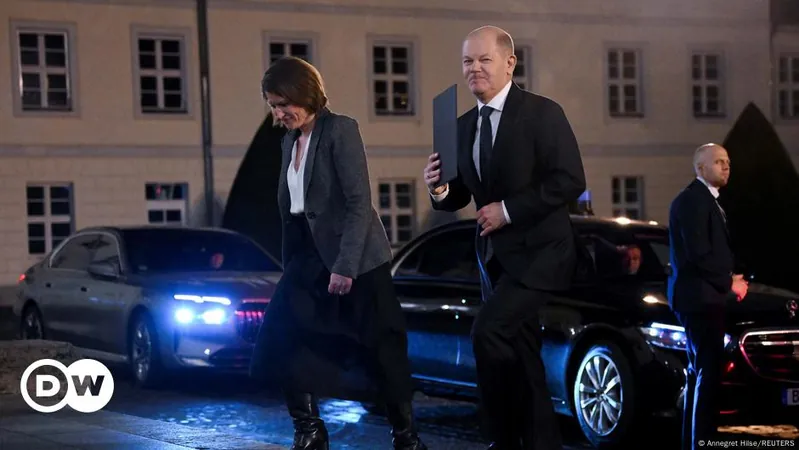
German Chancellor Olaf Scholz Faces Political Downfall – Early Elections on the Horizon
2024-12-16
Author: Jessica Wong
Key Developments:
Scholz’s Social Democrats (SPD) are currently trailing behind Friedrich Merz's Christian Democratic Union (CDU) in the polls, with the CDU enjoying a lead of over 10 percentage points. This widening gap has prompted questions about the viability of the SPD-led coalition moving forward.
The loss of the confidence vote came after the Free Democrats (FDP) exited the coalition due to disputes over budgetary issues, leaving Scholz with only 207 votes in favor against 394 opposing lawmakers.
Political Reactions:
Britta Hasselmann, leader of the Greens' parliamentary group, criticized Scholz's leadership, suggesting that clearer direction could have avoided the coalition’s current turmoil. Meanwhile, opposition leader Friedrich Merz painted an even grimmer picture of the situation, accusing the Scholz administration of bringing shame to Germany with its handling of the economy and global relations.
The far-right Alternative for Germany (AfD) also capitalized on the situation, with party leader Alice Weidel attacking the government over economic mismanagement, particularly highlighting issues within the automotive sector due to rising energy costs.
Calls for Reform:
In the aftermath, Scholz met with German President Frank-Walter Steinmeier to discuss dissolving the Bundestag, which is a crucial step toward setting the date for new elections. The President is expected to approve the dissolution, though he plans to consult with various parliamentary groups before making an official announcement.
Scholz addressed pressing issues during his final speech before the vote, including plans to alleviate the cost of living crisis by proposing a reduction in the value-added tax on food from 7% to 5%, and raising the minimum wage to €15. He stressed the need to boost migration to fill labor shortages, highlighting the significance of Germany's diverse workforce.
The Road Ahead:
The upcoming elections present an uncertain future, marked by the challenges of forming a new coalition in a fragmented political landscape. With the potential for lengthy negotiations following the elections, it remains to be seen how the next government will address Germany's economic hurdles and international standing.
With these developments, the stakes are higher than ever as Germany approaches potentially transformative elections in early 2025, leading many citizens to wonder how their lives will be affected by the future leadership—and what legacy Scholz’s government will ultimately leave behind.
 Brasil (PT)
Brasil (PT)
 Canada (EN)
Canada (EN)
 Chile (ES)
Chile (ES)
 España (ES)
España (ES)
 France (FR)
France (FR)
 Hong Kong (EN)
Hong Kong (EN)
 Italia (IT)
Italia (IT)
 日本 (JA)
日本 (JA)
 Magyarország (HU)
Magyarország (HU)
 Norge (NO)
Norge (NO)
 Polska (PL)
Polska (PL)
 Schweiz (DE)
Schweiz (DE)
 Singapore (EN)
Singapore (EN)
 Sverige (SV)
Sverige (SV)
 Suomi (FI)
Suomi (FI)
 Türkiye (TR)
Türkiye (TR)